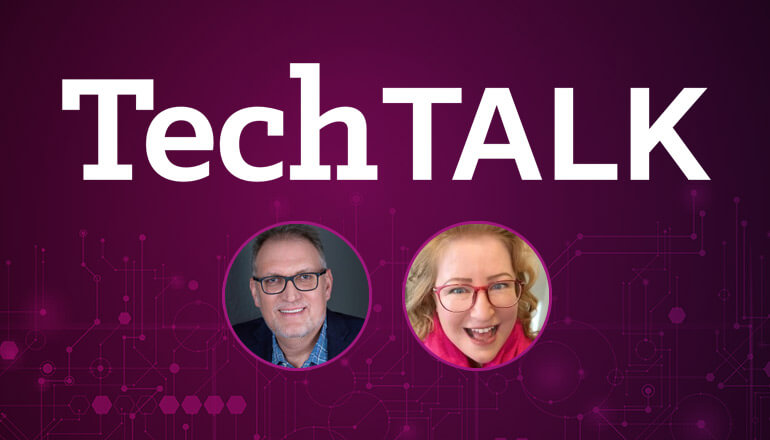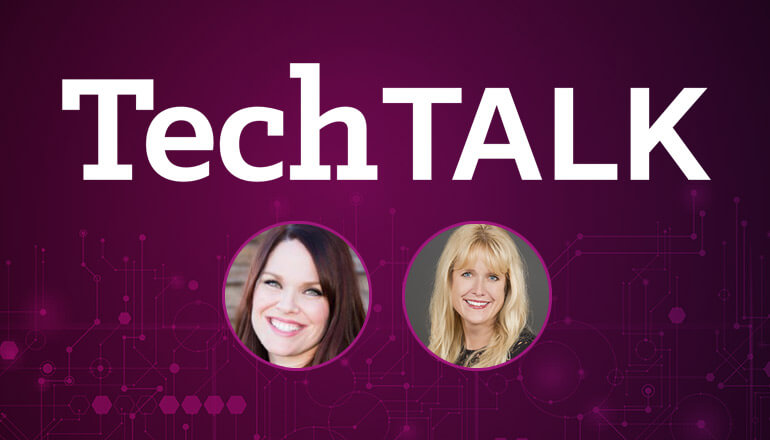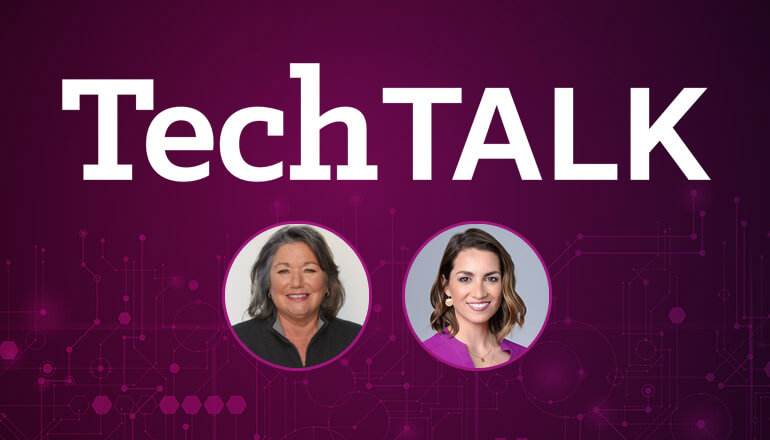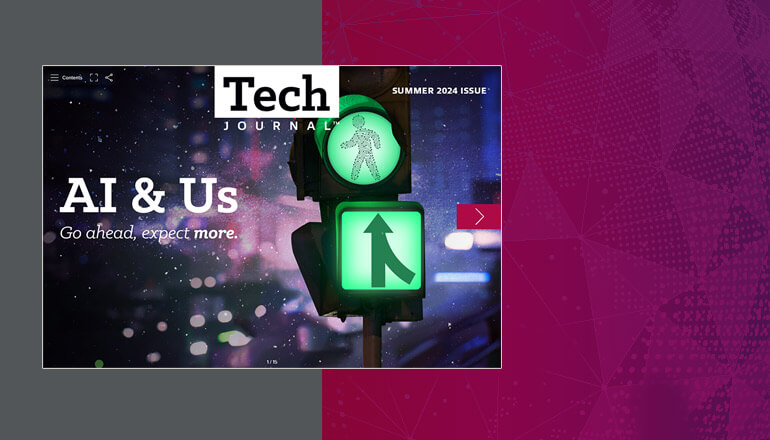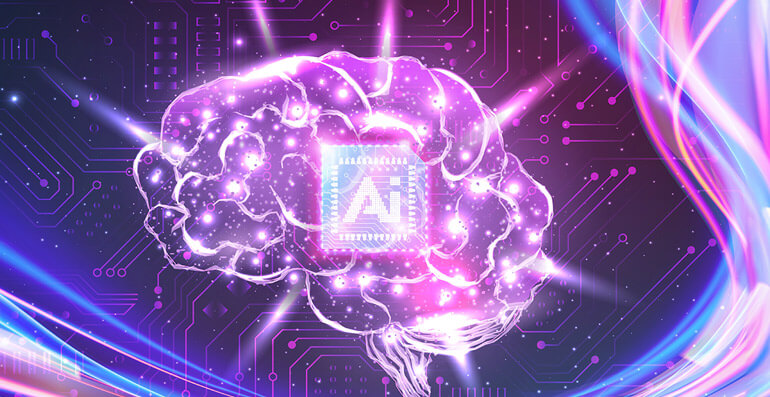Audio transcript:
How AI Is Powering SMB and Enterprises for Faster ROI
(upbeat music)
Jillian
Hello, and welcome to another edition of Insight Tech Talk. AI is everywhere. It's coming to devices, data centers. You probably aren't working on a project that doesn't involve AI. And so to really help frame the conversation today, we thought no better than to bring in experts from two leading brands in the AI space to really dive in about how AI can help power small businesses, commercial businesses, and start to get to ROI faster. So just a quick pulse of the environment right now. Insight did a survey earlier this year to find out employee perceptions about AI PCs coming to the workplace. And it turns out that a significant 79% of employees believe that their employer will initially provide select business functions with AI powered devices. And of course, we do expect AI to proliferate in other places of the business. So before we dive in, let me first introduce you to our amazing panel today. All the way from Lenovo, we have John Encizo, principal technical consultant and field CTO. Also from Lenovo, Pooja Sathe director and business leader for Worldwide ThinkPad AI PCs. And from Intel Joab Paiva America's commercial sales strategy lead at Intel. So welcome everybody. It's so nice to have you all here. You all look great. Are you excited about today's conversation about AI?
John
Very excited, very excited. Looking forward.
Pooja
Absolutely.
Jillian
We're not over it. This trend is not going to die down. Pooja, I'm going to toss this over to you to start us out, just give us a really quick look at the landscape right now of AI.
Pooja
Jillian, thank you first of all, thank you for having me on this panel. I am excited to talk about AI and AI PC with my colleagues here, John and Joab. And to be honest, AI is ubiquitous, right? It's everywhere. Everyone is having conversations about AI and it's not new for Lenovo. Lenovo has been really leveraging AI to drive intelligent and digital transformation for quite some time now. And we know that it's going to definitely shape our future. The most important thing here is AI has been on the cloud for a very long time, and it's now moving to the pc. The compute is moving to the pc and that is exciting. And whether the AI is residing on the cloud or it's secured in an on-prem environment, or it's really on your personal pc, it's really up to the customer and we leave it to our customers to make that decision on where the data resides, where the AI workloads happen. But overall, it's a very exciting time for the PC industry. And I'm sure we are going to dive into what AI brings to our customers. But I really want to kick off this conversation with defining the AI PC, right? Because if you think about the industry definition, it's very hardware centric at this point. But Lenovo is defining AI PC and it has five key features. Number one is really on cloud computing with heterogeneous CPU GPU and this new compute engine called NPU. And you would see that in Intel Core ultra press processors, NPU is a neural processing unit. So really ability to have trillions of operations per second on a PC is astonishing, right? Number two is personal intelligent agent on the device using natural language interface. We are seeing a lot of those in the industry on the cloud and seeing that coming on the PC locally. Now the number three feature for the AI PC is we are looking at the compressed LLM, or you may call it small language models residing on the PC to be able to have various different AI workloads. And number four is really around, hardware is not enough, right? You need the software experiences, and I always say hardware for software to follow. You would see a lot of AI applications in the market. So rich AI ecosystem of application is important. And number five is really around the secure and private environment for our customer. That's a core tenant of the AI PC because the data is residing locally and the inferencing is happening locally on the device. So a lot of good opportunities around AI PC, and as we talk to our customers, basically three out of four customers are looking at AI for their buying decision, right, as they're looking for the PC purchase. So a lot of opportunity for us here.
Jillian
I'm really glad that you broke that down and helped define what we mean when we're talking about AI PCs because of the excitement around AI, we're seeing that word sort of thrown around everywhere. It's adding a little bit of whimsy to the technology space, but really understanding what that means for an AI PC and the differences is key. John, I'm curious to know from your perspective, because we haven't quite focused on AI PCs for the last, we'll say several months. What do local AI capabilities mean for the data center perspective? Or how, I guess I should say, how is the market evolving for data centers?
John
Yeah, so really good question. And if we think about the concept of what I'm going to call data-centric compute. So traditionally, from the data center side, we've had these, what we call these concepts of data gravity, where we have these applications that generate masses of amounts of data. And we try and put, you know, we try and move that data, so we had sell more storage arrays and connect them to our SAP processing engine. And what we're seeing now with this evolution, so Lenovo has this concept of personal, private, and public AI. And I like to add in the extra piece of privileged AI, which is privileged data. So if we think about this concept of data centric compute, what we're seeing from a data center perspective, and by the way, that concept of the data center is actually evolving as well, we're seeing this pushing the AI closer to where data gets consumed and data gets created and where actions have to happen from that data. So what we're seeing is from a data center perspective, we're seeing compute move out to specialized devices at the edge. So Lenovo has a think edge portfolio that's designed around AI processing in your, we'll call them non-traditional environments. So in a wiring closet, in a retailer, in the plenum of a hospital room for, you know, looking at computer video and telemetry data. So we're seeing one push of moving the processing out to the edge, and then we're seeing a lot of push from the data center side to start having this concept of hybrid AI. And again, that's because a lot of companies have data living in the public cloud, but they also have privileged data that's still in their traditional data center.
So we're seeing the data center evolve to take advantage of this new AI centric computing model. And really what that means is, if you look at the last 20 years, the data center has been primarily about three things, right? Running databases, running virtual machines, and storing files. And what we're seeing now is moving to this concept of AI enabled data centers. The requirements have changed. And so now you have to have this enormous compute capability to ingest all that data and start to do something with it. So we're seeing specialized systems being generated. So Lenovo just announced a SR-680, SR-685, and SR-780. These are multi GPU, eight GPU boxes designed to consume all that data, so you can start using some of those generative AI capabilities, building models, fine tuning models. We're also seeing a huge push, you know, CoPilot on the AI PC is wonderful, but you have to have your data governed, right? Security needs to be set up, backup needs to be set up. Accessing these models and securing these models needs to be done.
And so the data center's transforming in that perspective as well, where we're seeing a lot of customers push back and start doing data governance and starting to look at hybrid storage models. And I think the last thing that we're seeing from a data center perspective really is a lot of customers are looking for, you know, I want to do this in the cloud, I want to do this on my pc, but I also need to have a middle ground. So we're seeing a lot of customers starting to look at the costs in the cloud to do some of these bulk training activities, these tuning activities. And we're seeing the impact be, you know, what if I'm going to deploy a small large language model, which by the way, I love that, that is such an oxymoron, right? Because you're talking billions of parameters. If I'm going to do that, I want to train that somewhere and make sure that model is secured, it's embedding my privilege data from my organization in it. So we're seeing a lot of customers wanted to build those things inside their four walls because they want to be able to protect that information. So I think that's where we're seeing the data center space evolve to connect the AI PC to the data and the data and data sets that are sitting in their data centers.
Jillian
You covered a lot right there. And the main takeaway that I'm hearing is that AI is not really an option for businesses, it is the future.
John
Right.
Jillian
If you don't embrace AI in some capacity, you're going to be left behind. We talked about what that means for PCs. We've now covered what that means for data centers. As businesses are really thinking strategically about their long-term AI strategy, what else do they need to be considering?
John
Wow. Couple things.
Jillian
It's a big question.
John
Yeah, it is. So from an AI strategy, and I love that you say is businesses looking at their AI strategy 'cause one of the first things I talk to customers about frequently is, look, if you're going in this from a technology first perspective, you're going to end up throwing a lot of money and creating a lot of disappointment. I mean, there's a stat that 30%, it's a Gartner statistic, that 30% of customers, there's these gen AI POCs, are going to end up in disappointment. They're going to end up in failure because it was a technology looking for a use case. And so, talk when we talk about-
Jillian
There's a flashy thing you're trying to figure out how to use this flashy thing.
John
Exactly. Right, for those who remember the movie Up, right? It's squirrel syndrome. It's IT squirrel syndrome.
Jillian
Yes.
John
Oh, it's flashy. Go chase it. So what we're seeing is building that strategy really is involving data, going back to data, it's a data-centric approach. What is the experience I want to create based on the data that we have at hand? So do I need to build a model? Do I need to buy AI as a service, or do I want to take an open source thing and optimize it with my business data to create more differentiated value? So customers need to think through, you know, do I create differentiated value or do I use AI as a service? They also need to think about do they want to bleed? Do they don't want to lead, or do they want to be a fast follower? We're seeing a lot of folks that have kind of been out there trying to bleed or coming back and they spend a lot of money and not had a lot of ROI. So when you're thinking about building a strategy, you know, I like to boil it down. First thing is get your data in order, get your data house in order. The next is you need to be asking yourself, why are we doing this? Are we trying to create differentiated value that drives revenue? Or are we looking to do something that reduces risk, reduces costs, increases productivity, which is kind of a mushy term, but essentially makes my employees more efficient in what they do and also more effective in how they do their job. That needs to kind of drive the AI strategy. And from that will trickle, where do I run the AI? What kind of AI do I use? What are the data requirements? What are the thing that a lot of people don't think about, right? What are the ongoing support costs? You know, building AI models, deploying AI solutions. It's generally three to four times what you put in to build it is the ongoing lifecycle management. So you need to be thinking about all of these things. How am I going to train my people? You know, you can't just drop CoPilot on somebody and say, go be productive, you know?
Jillian
Right, make this thing work for you.
John
Exactly, train folks. I mean, we just sat through, you know, Lenovo, we just sat through CoPilot training yesterday. Here's some prompts to make you more effective right out the door.
Jillian
Yeah, we actually found in our survey that that's one of the biggest requests from employees because they know AI is coming. They expect their employers to train them on how to use it to make use of it. And it's truly in the employer's best interest to invest in that training for their employees to get that ROI You mentioned data a lot. Are there data center prerequisites for AI success?
John
Yes, thank you. Great question. Tons of data centers, prerequisites. As I mentioned kind of the first is whatever you're going to do, you have to make sure that you have, if you're going to use AI on data, first you have to make sure that you have the data to create a baseline to support the AI use case. So being able to connect all of your data sources, that's one of the big problems we see is that AI sort of uncovers all the skeletons in the data closet. So what we like to, you know, what I like to say is, you know, when you start flashing AI around inside a data center, you start seeing all these multiple copies of data each slightly different. And you start seeing all these different systems that are, you know, it could be a software as a service, maybe it's service now, maybe it's dynamics, and then maybe you have your custom database that you're doing shipping and logistics. You've got all these different data sources with slightly different data, so when customers don't have this concept of master data management in place, a lot of times what we see is they get these false starts. So prerequisite, get your KPIs in place first, get your data to support those KPIs, and then work backward from there into the technology and make sure that other biggest thing, and I know this is counter, this should go without saying, but sometimes you have to state the obvious. If you don't bring your stakeholders in and the people that are going to be leveraging this at the beginning, it's another recipe for failure. So those are sort of the precursors before you can really start driving value out of AI.
Jillian
Excellent advice. Joab, I'm going to turn this over to you because Intel has really been a big key player in part of this AI device movement. Can you kind of walk us through as much as you can, what is Intel's overall AI strategy?
Joab
Yeah, of course. First of all, happy to be here, you know, with you and this amazing team from Lenovo. And Intel strategy, it's AI strategy is quite simple. It's to bring AI everywhere. Pooja mentioned that, right? But how? I think, you know, the key thing here is how. For Intel, for Intel point of view, it's hardware, hardware architecture, it's the foundation for us, right? CPUs, NPUs, graphic cards, all of these that support, you know, bringing AI everywhere from chip to cloud, from cloud to edge, going through, you know, the client. But on top of the hardware, the key thing for us is how can we enable customers and partners to accelerate innovation? That's the second thing that, I mean, we're investing a lot with programs and people and money, but the whole idea is to have an open, you know, open tools that will enable our partners to, you know, accelerate innovation. But for the customer itself, it's all about choice, right? Intel is in the business where to give our customers choice, right? At the same time that we're building all this, you know, we're bringing AI everywhere with trust, right? On AI inference or secure AI. But our main business is to scale, right? Yes, we have all those infrastructure, we have all those hardware and software tools. The whole idea is to scale, is to bring AI not only everywhere, but through every single person in the earth. So this is our kind of AI strategy in a nutshell.
Jillian
And I'm assuming that AI PCs is a pretty big piece about strategy.
Joab
Oh yeah, AI PC, you know, it's near and dear to my heart. That's where I work at Intel, but AI PC, it's not a new, it's kind of new concept is the new word for us because of this generative AI buzz that we're hearing, you know, in the past year or so. But AI on PC is not new. Pooja mentioned that, right? We are doing AI at least the past 13 years, but the AI on a PC or running locally, it's more in a system. It helps the user to do something in the backend or helps IT. We shouldn't forget about IT, right? We're bringing a lot of AI use cases for users, CoPilot be more productive and things like that. But we shouldn't forget about IT and how AI is assisting IT in the past, and that's what we're doing in the past 13 years, right? Making the whole device more secure, right? Using AI and, you know, in a confined space in your pc. But the evolution for us, for Intel, and the main idea you have AI capabilities inside a PC is to, you know, is to get more personalized, you know, information out of AI. You're not, I mean, big companies or small companies, you don't want to share your data, personal data into the cloud, right? But you have to train, software developers have to train their software in the cloud. But when it comes to deliver customized, personalized response to the user, you have to deal with your local data. So having AI on a PC will enable this, right? And will enable a lot of different segments to adopt AI faster because yeah, we're not sharing combination information to the cloud. And I think that's what John is saying. And we're seeing, you know, a balancing between what is what we can do in the cloud, what can we do in pc? And we are going to have those two worlds working together to provide the best user experience, not only for your users, but for IT as well.
Jillian
A very common theme we hear about is empowering the workforce, accelerating transformation, accelerating business outcomes. John, from your perspective, how is Intel and Lenovo, how are you empowering users with innovations in a AI PCs and data center accelerators? What's the impact that's happening?
John
Wow, good question. And by the way, one of the big things I want to point out is that a lot of times those things that you talked about upfront, those are the great marketing terms that we like to throw around. But when it actually becomes, how do we deliver this in reality, this is where, for example, we have a solutions and services group and we partner with inside as well to actually help customers identify, you know, great, you want to deliver productivity, but what does that mean? So one of the things that we're doing together is we have these ideation workshops, AI discovery workshops to help customers actually crystallize what they want to accomplish. And then if we look at the development from the AI PC, the development in the data center, we're creating systems that are going to give you secure control of AI models that are going to allow you to process data in the location that makes the most sense from a cost efficiency perspective, from a latency perspective, from a security perspective. And then, you know, other things that we're working on with Intel, so we're in the process of qualifying some of the new intel GPUs in our platforms. Why? Because we can see that there's benefits for those customers that want to have choice and flexibility in how they create, consume, and deliver AI.
And I think that's really where you see this really wonderful partnership. Intel's, you know, a lot of folks don't realize Intel has a massive software development arm. They have a whole set of toolkits, OpenVINO that's designed for customers to actually develop AI for Intel chips. You know, 'cause a lot of people, they get confused, they think in AI equals Nvidia. And the reality is that that's not the case. Much of the inferencing that happens in the world. And for those that don't know what's inferencing is, that's where I actually use an AI model to deliver some kind of value. It doesn't happen on Nvidia chips, it happens on mobile phones, it happens on PCs today with Intel processors. And so what we're seeing is that, you know, this ability to have these software toolkits to make it simple develop is going to drive that kind of future forward let's make you productive with AI and here's some crystallized metrics. And I think the last thing to to point out is that, you know, if we look at AI, we're squarely what I like to call the mountain of lies, right? If everybody's familiar with the Gartner hype curve. If we're talking about AI, chances are we're probably not making money with AI. So if we can get metrics that tide a business and we start embedding AI in those workflows and we start using things like AI PC as a data center, data center systems to deliver AI, our end users, they're going to not talk about AI. They're going to talk about what they did today. And I think that's the eventual goal. And we want to move past talking about the technology to making money with the technology. And we're not there yet, but we're getting there. We're starting to slowly get there.
Jillian
Great point. I love that you called me out on my marketing buzzwords because that is what they are. So I want to press you. Can you give us a concrete example of a client success story? What's a real life example of AI coming into the field and making a difference?
John
Sure, we have a perfect example. We have a, Lenovo has what we call an AI innovators program. And really what our AI innovators program is, you know, we're a firm believer that for a company to succeed in AI, it's really, it's the development of a set of ecosystem partners. So what Lenovo's done is we have these ISVs that are part of our AI innovators program that we validate from a technology, a business, a trustworthy and ethical AI perspective. We go through and we evaluate these specific AI ISVs and say, hey, do you have a product that solves a very specific business problem that meets those trustworthy AI, those business and technology criteria. And most importantly, that has a definable ROI. So as part of that, we've got a couple of AI innovators, I'll speak on one specifically. They're really focused around retail and we've got some really good wins in, we'll call them kind of big box type retail and also some smaller what mall settings. And really what we're seeing is the use case around that is looking how people move through space. And that may not sound really exciting as we say it that way, but imagine you are a retailer and you are trying to figure out how do I set up my store? What are people looking at? Where are people stopping? I can actually turn around and monetize my planogram and now I have data that goes with it.
And so this is really where we're seeing this kind of successful use case where we've had multiple customers that are actually doing this kind of thing where they're putting this AI in the retail establishment and it helps them reduce operating costs. More importantly, it helps them drive additional revenue in two ways. One, it helps them drive revenue because now they can optimize the store layout and optimize how and when and where they schedule employees. Because let's think about it, 25% of companies are leveraging AI because there's not enough workers in the workforce. But the other thing it does is now it gives me a set of data that I didn't have before that I can now turn around and not just save money with that information, but I can now take that data set and leverage that. And I have customers that are actively doing that today with our AI innovation partners.
Jillian
Monetizing human behavior, that's very interesting. Pooja, you've been pretty quiet over there. I'm hoping you can help bring us home here. AI PCs, again, we can't say enough good things about them, but maybe you can just hammer home, what are the greatest benefits and why should companies invest in AI PCs now versus waiting until, I don't know, a year or two years, three years? What's the imperative?
Pooja
This is the question Jillian, everyone is asking, right? This is a very important question.
Jillian
There's dollars involved.
Pooja
Absolutely. But I'll go back to what John mentioned, right? And I think it's really important. Like if you just go from a technology mindset, you may fail. You have to really ask this question, why AI PC? And what is that business problem that I'm trying to solve, right? What is that business value that I am deriving from these AI PCs? And honestly, like since we get asked this question so many times, and we are very early stages of really AI compute locally on the pc, we defined a very simple strategy for the AI PC. It's our 3P framework. So would like to talk about that simply because it really helps bring the point on the value that AI PC would deliver to our customer. The first P is personalization, right? So personalized experiences, personalized recommendations. Really think about an AI agent on your pc, having contextual intelligence of what you are doing, what meeting you are preparing for, really providing you insights for that meeting, providing you recommendations. So really providing personalized experiences. And it doesn't need to be limited to individual, but personalized experiences for the organizations. For departments, right? Whether it's marketing or HR or finance. So that's our first P, personalized experiences. Our second P is productivity. And I think nobody's going to argue with that because it really starts with, how can I save more time with AI? How can I be more productive? How can I automate some of the workloads and really augment my day and work on value creation, work on some of the tasks that really need human attention in decision making, right?
So you would see a lot of tons of use cases around productivity and some started with code development, right on the pc. A lot of it is around content creation, whether it's video editing, audio editing. So you would see a lot of those use cases, whether it's Microsoft CoPilot, right? A lot of those use cases are really around productivity. So I think that's the biggest pillar of our 3P strategy. But our third P is something which is the foundation and which is protection, protected, right? Protected experiences for our customer. Because that's the core tenant of AI PC because everything is on the PC locally secure and private. And in fact, you can use AI for better threat protection, for anti phishing technology, for putting guardrails for your LLM. So there are so many things that you can do with AI to make sure the workloads that you're running on your device is secure and private. So that's our 3P strategy. But I also want to say, Jillian, you asked the question around why should we invest now? Because there are not many experiences you would see in the market right now, as I previously alluded to the point that you have this capable hardware with this new compute engine, it's becoming more powerful, right? It's ability to run trillions of operations per second at a very, very low power. What would happen now, we would see a lot of ISVs really developing solutions for the pc.
So it's important for our customers to think about it. They are going to buy the PC now and may not refresh in the next three or four years. The technology is moving rapidly, it's really fast. What's going to happen next year or year three, I think even we won't be able to tell you right now, right? So if the customers are already thinking about, I would really want to use AI to improve productivity for my employees, or I would want to use AI for my product development, you should invest in the AI PC now. And I always say like, it's like a smartphone. Think about, we had phones, the flip phones, right? Or you may say dumb phones and now we have smartphone. All of the phones are smartphones now. So you would, we expect the same trajectory on the PC side, right? You would see in the next couple of years, all the PCs will be running AI workloads locally. So all of the PCs will be AI PCs. So again, a lot of opportunity for our customers. It's a difficult decision I understand because we don't see the ROI right now, but it's something to really start with. What is it that I want to do with AI and AI PC.
Jillian
Baby steps of adoption. You don't want to get into late when things are drastically different.
Pooja
Yes.
Jillian
We've got about 30 seconds left and there's a really big reason why the three of us are on this call. I know there's four of us, but three brands. Joab, I'm going to put it on you. What do you see as the greatest value of the partnership between Intel, Lenovo, and Insight?
Joab
Oh, for us as a technology provider, right? We rely on our partners. So Lenovo and our, you know, deep relationship and developing, I'm not going to say products, we're not developing products anymore, we're developing solutions, right? I think that's the critical thing. We're talking about, you know, solving customer pain points. We're talking about give user new experiences, enable them with new experience. So this is delivering a solution. With Lenovo, you know, it's a co-engineering type of development. And Lenovo and Intel. We need Insight to actually wrap all these in a nice package and deliver to the customer, understand the customer pain points, understand their needs, right? And then be able to fit the right solution that we enable in the background, right, to the customer need. I think that's the, you know, the beauty of this partnership, right? Three of us, you know, to truly give solutions that it's meaningful, that it's will solve issues or enable new experiences on the market.
Jillian
Well said. So for organizations, whether you're preparing for your next device refresh, or thinking about your long-term AI strategy, you've got a core group of partners here are prepared to help you navigate that journey. We've got workshops and great information, great consultants that can help you make smart IT decisions to help you deliver value to your business faster. I'd like to thank our panel today so much great information, insights, thank you for your time. If you'd like to learn more information about any of our partners today, please visit insight.whylenovo.com or check out any pages on insight.com. We've got great resources listed in the show notes. Thanks for joining us and we'll see you next time.







